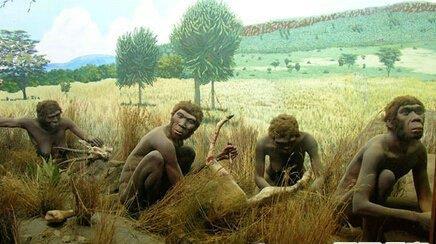


The story of human evolution may have to be revised after a series of finds across China have led experts to believe that human life may have independently evolved in Asia, as well as in Africa, challenging conventional scientific thought.
Zhao Lingxia, a research fellow at the Institute of Vertebrate Paleontology and Paleoanthropology (IVPP) under the Chinese Academy of Sciences led a team of researchers who discovered three teeth that have similarities to those of modern humans in a limestone cave in Bijie, Southwest China's Guizhou Province. The results were published earlier this year in Chinese journal Acta Anthropologica Sinica.
Dating the sediments where the teeth were found indicates that they were buried 112,000 to 178,000 years ago, some 75,000 years earlier than when the first modern humans walked out of Africa, the South China Morning Post (SCMP) reported on July 11.
However, more needs to be done to attempt to date the teeth, as geologic upheaval can affect the surroundings in which fossils are found, so the dates could be misleading.
It is the latest discovery made by Chinese paleoanthropologists that questions Africa's status as the cradle of humanity.
Zhao's colleagues, Liu Wu and Wu Xiujie, also found 47 tooth fossils in Daoxian county, Central China's Hunan Province in October 2015. The fossils date from 80,000 to 120,000 years and are believed to be the oldest remains of a completely modern form scientists have found in the East Asian region, the Xinhua News Agency reported previously.
Previous studies indicated that humans with modern features appeared in western Asia and Europe around 50,000 years ago.
"There is overwhelming evidence from the fossil records that China was populated with humans before the arrival of African settlers," Liu was quoted by the SCMP as saying.
In November 2015, Chinese scientists discovered the fossilized skull of a Homo erectus in Dongzhi county, East China's Anhui Province, according to Xinhua.
The skull, which shows the face of a Homo erectus, dates back around 150,000 to 412,000 years or even earlier, Liu said.
This is another important site for Homo erectus after findings were made in Zhoukoudian, where Peking Men lived, and Lantian in Shaanxi Province, Hexian county in Anhui Province and Nanjing in Jiangsu Province, said Liu.
Human fossils have been discovered across much of southern China in the last decade, many of which date back 100,000 years or more, but which share similar anatomical features with the Chinese people living today.
Celebrated paleoanthropologist Wu Xinzhi from the IVPP wrote in the same issue of Acta Anthropologica Sinica that a thorough examination of the stone tools made by ancient people in China from 130,000 to 8,000 years ago demonstrates that manufacturing techniques had been passed down with consistency generation after generation. Their features are distinct from the stone tools made by early African migrants.
The stone tool cultures and the large amount of ancient human fossils uncovered in China suggested a "seamless evolution" toward the present-day Chinese people. Even if the arrival of African migrants might have introduced certain new genes, no replacement or mass extinction had happened, Wu was quoted by the SCMP as saying.
Shift from Africa
"Many Western scientists tend to see Asian fossils and artifacts through the prism of what was happening in Africa and Europe," Wu told Nature magazine on July 12.
Those other continents have historically attracted more attention due to the antiquity of fossil finds there and because they are located nearer to major paleoanthropology research institutions, Wu noted, stressing that "it's increasingly clear that many Asian materials cannot fit into the traditional narrative of human evolution."
Chris Stringer, a paleoanthropologist at the Natural History Museum in London, said Asia has been a forgotten continent. "Its role in human evolution may have been largely under-appreciated," he was quoted by Nature as saying.
There is a consensus that the evolutionary story in Asia is much more interesting than previously considered.
In 2003, a discovery in a cave on the Indonesian island of Flores turned up the world's earliest humans, Homo floresiensis, which were dubbed "hobbits."
They lived some 60,000 to 100,000 years ago, 10,000 years before Homo sapiens arrived, Science reported in March, 2016. This means they are not a "diseased Home sapien," but a separate species, researchers said.
 Who Will Fit The Chinese Roles In Game Of Thrones?
Who Will Fit The Chinese Roles In Game Of Thrones? China's Hubei Shennongjia added to World Heritage List
China's Hubei Shennongjia added to World Heritage List "Straddling bus" starts production in east China
"Straddling bus" starts production in east China Girl goes viral for finger-long toes
Girl goes viral for finger-long toes Five made-in-China hi-tech breakthroughs
Five made-in-China hi-tech breakthroughs HK-Zhuhai-Macao Bridge to open to traffic
HK-Zhuhai-Macao Bridge to open to traffic China opens its first combined transport service to Nepal
China opens its first combined transport service to Nepal Students take stylish bikini graduations photos
Students take stylish bikini graduations photos Charming dancing students pose for graduation photos
Charming dancing students pose for graduation photos Top 10 livable Chinese cities
Top 10 livable Chinese cities Top 20 hottest women in the world in 2014
Top 20 hottest women in the world in 2014 Top 10 hardest languages to learn
Top 10 hardest languages to learn China’s Top 10 Unique Bridges, Highways and Roads
China’s Top 10 Unique Bridges, Highways and Roads Arbitration creates little more than noise
Arbitration creates little more than noise Western fast-food firms contribute to China’s economy
Western fast-food firms contribute to China’s economy Watching live streaming fur babies is entertaining, interactive and stress-relieving
Watching live streaming fur babies is entertaining, interactive and stress-relieving Visitors to Rio concerned by virus, crime and high prices
Visitors to Rio concerned by virus, crime and high pricesDay|Week